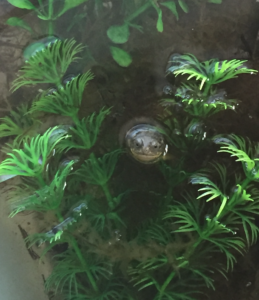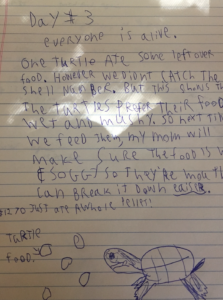What happens when a non-scientist writes about science?
She might wade through a deep pool of self-doubt and imposter syndrome, for starters. At least I did.
I have always had a strong interest in science, especially environmental science. I enjoyed science classes throughout my education, even if I struggled sometimes, and I really loved the few science classes I took in college. Yet I somehow let myself get steered exclusively toward the Humanities, and into an English major, never really considering how these fields need not be mutually exclusive. I told myself a lot of super unhelpful stories as early as ninth grade: I’m not good at math. You need to be good at math to be good at science. I’m not really a scientist type.
I don’t know where I got the idea that I had to pick one path and stick with it, and why I never let myself fully explore an interest in science, or get the help I might have needed in math to boost my confidence. I graduated from high school just before a big push to get girls into science began.

A Blanding’s turtle hatchling we fostered in our home
Whatever the reason, I continued to tell myself unhelpful stories about my aptitude for science even as I cultivated the idea for my new eco-mystery, Trouble at Turtle Pond, back in 2017. I wanted to write about the turtles my son and I were caring for as part of a conservation program his school had partnered with. I wanted to show the fascinating work that wildlife biologists were doing in the field to bring back our area’s native population of endangered Blanding’s turtles. I would scribble ideas – and scribble them out, telling myself I wasn’t qualified because I wasn’t a biologist, I had no degree in science, I didn’t really know what I was talking about. Or did I?
Eventually the urge to tell the story overcame the fear. And I completed the draft of the book. I decided if I had written outside my comfort zone and immediate knowledge before – which I had done in all my previous novels, writing of places and professions that were not my own — I could do it again. It just felt scarier this time around, because, well, science. As I had with the other books, I sought expert help when I was ready. This time it was in the form of a wildlife biologist, who read the book very carefully and offered incredible feedback. I was surprised how much my research had paid off, how much I’d gotten right. And yes, I’d gotten some things wrong, and was very grateful for his patient corrections! But at no point did he or anyone suggest I was doing the wrong thing by writing about science, and about citizen science sleuths helping a local wildlife biologist to solve some turtle mysteries.
Not only that, when I applied for a mentorship program to get guidance on writing a teachers’ guide and a series of related talks and workshops, my application was selected! I am now a 2021-22 mentee in Creature Conserve‘s mentorship program.
Creature Conserve is an organization founded by Dr. Lucy Spelman, who is a board-certified veterinarian in zoological medicine, a media consultant, a writer, and an educator. The mission of Creature Conserve is to bring artists, creative writers, and scientists together to study, celebrate, and protect animals and their habitats. In addition to this mentorship program I’m participating in, they run a series of professional development workshops for artists, writers and scientists, which you can read about here. The workshops are open to anyone for a fee. I attend my first one yesterday, and came away feeling inspired and empowered to work for conservation as a creative person. Dr. Spelman acknowledged that conservation efforts are lagging partly because scientific literacy is low, scientific information about conservation issues is not always accessible, and people tend to feel either hopeless or intimidated – or trust that “other people” are out there working to save the climate, animals, etc. But we need not be scientists to do conservation work. I learned this is a multifaceted problem that requires an interdisciplinary approach. Artists and writers make important contributions to conservation efforts by helping people to connect to nature, and by raising awareness of the need to protect specific creatures and their habitats. Narrative and imagery are important tools, just as scientific data is an important tool.
I am proud of bringing my turtle book and supporting materials into the world to help do my part as a creative conservationist, and look forward to posting updates here as I progress through the program!

My son’s notes on the hatchlings we fostered; a young citizen scientist in action!